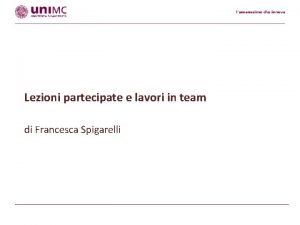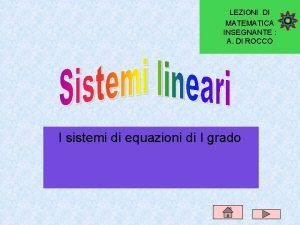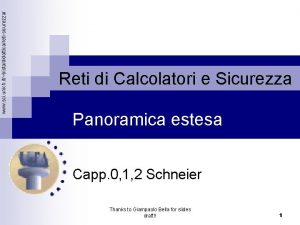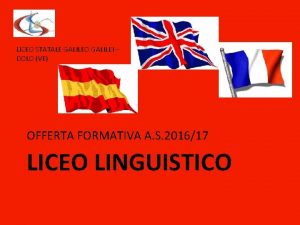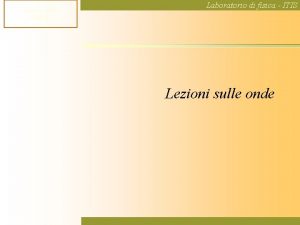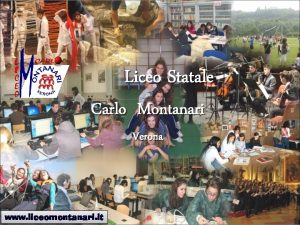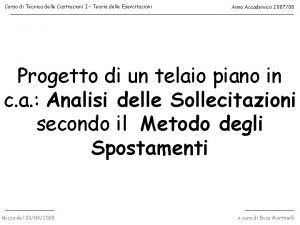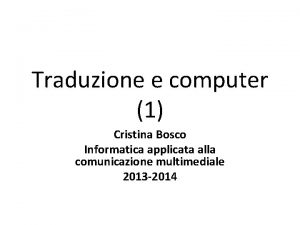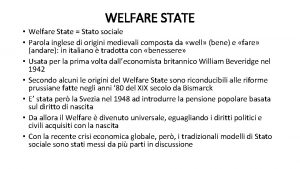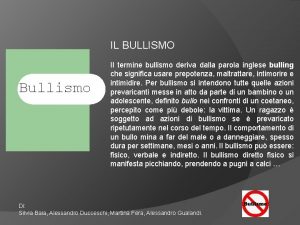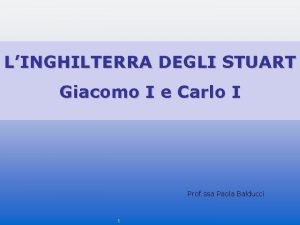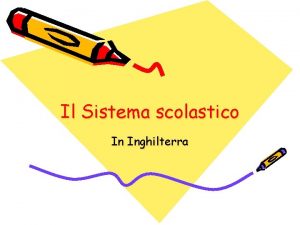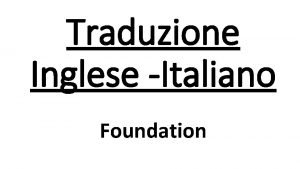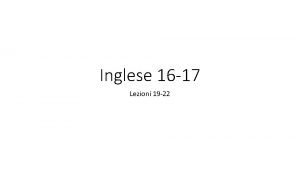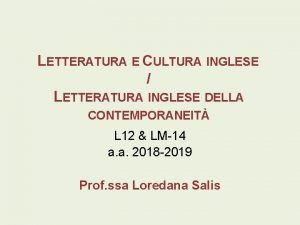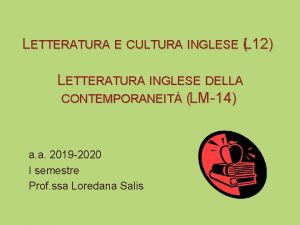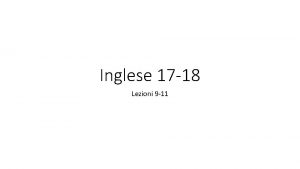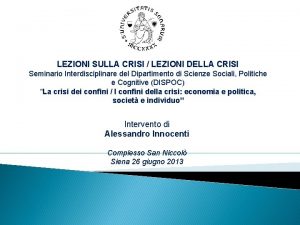Inglese 16 17 Lezioni 16 17 Luned 14




























- Slides: 28

Inglese 16 -17

• Lezioni 16 -17 • Lunedì 14 Nov.

AVVISI • Lezione di recupero Lunedì 21 Novembre alle ore 17 aula E • Proviamo a programmare le presentazioni in classe

Continuiamo a leggere da Reid, Essays on the intellectual powers of men (1785), Essay 3, Of memory, Chapter 4: Of Identity If you ask for a definition of identity, I confess that I can’t give one; it is too simple a notion to admit of logical definition. [For Reid’s linking of ‘logical definition’ to simplicity, see the first two pages of Essay 1, chapter 1. ] I can say that it is a relation, but I can’t find words in which to say what marks identity off from other relations, though I’m in no danger of confusing it with any other! I can say that diversity is a contrary relation, and that similarity and dissimilarity are • another pair of contrary relations, which everyone easily • distinguishes, conceptually, from identity and diversity. • •

• I see evidently that identity requires an uninterrupted • continuance of existence. Something that stops existing • can’t be the same thing as something that begins to exist at • a later time; for this would be to suppose that • • a thing existed after it had stopped existing, and • • existed before it was produced, • and these are both manifest contradictions. Continued • uninterrupted existence is therefore necessarily implied in • identity.

• From this we can infer that identity can’t properly be • applied to our pains, our pleasures, our thoughts, or any • operation of our minds. The pain I feel today is not the same • individual pain that I felt yesterday, though they may be • similar in kind and degree, and may have the same cause. • This holds for every feeling and for every mental operation. • They are all successive in their nature, like time itself, no • two moments of which can be the same moment.

• It’s not like that with the parts of absolute space. They • always are, were, and will be the same. Up to this point I • think we are on safe ground in our moves towards fixing the • notion of identity in general.

• It is perhaps harder to ascertain precisely the meaning of • personhood, but for the present topic we don’t need to. For • our present purpose, all that matters is that all mankind • place their personhood in something that can’t be divided or • consist of parts. A part of a person is an obvious absurdity.

• • • When a man loses his estate, his health, his strength, he is still the same person and has lost nothing of his personhood—·i. e. he is just as much a person as he was before·. If he has a leg or an arm cut off, he is the same person that he was before. The amputated limb is no part of his person; if it were, it would have a right to a part of his estate, and be liable for a part of his debts! It would be entitled to a share of his merit and demerit—which is plainly absurd. A person is something indivisible; it is what Leibniz called a ‘monad’.

• • • My personal identity, therefore, implies the continued existence of that indivisible thing that I call myself. Whatever this self may be, it is something that thinks and wonders what to do and decides and acts and is acted on. I am not thought; I am not action; I am not feeling; I am something that thinks and acts and feels. My thoughts and actions and feelings change every moment; rather than lasting through time they occur in a series; but the self or I to which they belong is permanent, and relates in exactly the same way to all the successive thoughts, actions, and feelings that I call mine. These are the notions that I have of my personal identity. You may want to object:

• All this may be imagined, not real. How do you • know—what evidence do you have—that there is such • a permanent self that has a claim to all the thoughts, • actions, and feelings that you call yours?

• I answer that the proper evidence I have of all this is • remembering. I remember that twenty years ago I had a • conversation with Dr Stewart; … SALTIAMO QUALCHE RIGA. . . Everyone • in his right mind believes what he clearly remembers, and • everything he remembers convinces him that he existed at • the time remembered. • SALTIAMO UN CAPOVERSO

Contro Locke • What makes it the case that I was the person who • did such-and-such is not my remembering doing it. My • remembering doing it makes me know for sure that I did it; • but I could have done it without remembering it. The relation • to me that is expressed by saying ‘I did it’ would be the same • even if I hadn’t the least memory of doing it.

• • • This thesis: • My remembering that I did such-and-such—or, as some choose to express it, my being ‘conscious that’ I did it—makes it the case that • I did do it seems to me as great an absurdity as this: • My believing that the world was created makes it the case that • it was created! The point I’m making in this paragraph would have been unnecessary if some great philosophers hadn’t contradicted it.

• When we pass judgment on the identity of people other • than ourselves, we go by other evidence and decide on the • basis of various factors that sometimes produce the firmest • assurance and sometimes leave room for doubt. The identity • of persons has often been the subject of serious litigation in • courts of law. But no-one in his right mind ever had doubts • about his own identity as far as he clearly remembered.

• The identity of a person is a perfect identity: wherever • it is real, it doesn’t admit of degrees—it is impossible that • a person should be partly the same and partly different, • because a person is a monad [Reid’s word] and isn’t divisible • into parts. Our evidence for the identity of other people does • indeed admit of all degrees: we can be absolutely certain [AGGIUNTO DOPO LA LEZIONE: segue l’esempio di Martin Guerre, che tralasciamo]

• We probably at first derive our notion of identity from • the natural conviction that everyone has had, from the • dawn of reason, of his own identity and continued existence. • The • operations of our minds are all successive, and have • no continued existence. But the • thinking being has a • continuous existence, and we have an irresistible belief that • it remains the same through all the changes in its thoughts • and operations.

• • • Our judgments about the identity of objects of sense seem to be based on much the same kind of evidence as our judgments about the identity of other people. Wherever we observe great • similarity we are apt to presume • identity, if no reason appears to the contrary. When two objects are perceived at the same time, they can’t be one object, however alike they may be. But if they are presented to our senses at different times, we are apt to think them the same, merely because of their similarity. SALTIAMO 2 CAPOVERSI

• Thus it appears that • the evidence we have of our own • identity as far back as we remember is of a totally different • kind from • the evidence we have for the identity of other • persons or of perceptible objects. The • former is based on • memory, and gives undoubted certainty. The • latter is based • on similarity and on other facts that are often not so decisive • as to leave no room for doubt.

• Lezione 18 • 15/11/16

• Riprendiamo la lettura di • Reid, Essays on the intellectual powers of men (1785), Essay 3, Of memory, Chapter 4: Of Identity • Siamo a inizio p. 142 del testo che ho messo nel sito

Cfr. identità in senso lato di Butler • The identity of perceptible objects is never perfect. All • bodies have countless parts that can be separated from • them by various causes; so they are subject to continual • changes of their substance—increasing, diminishing, changing • insensibly ·by gaining or losing very small parts·. When • something alters thus gradually, it keeps the same name • (because language couldn’t afford a different name for every • different state of such a changing being) and is considered as • the same thing. ANDIAMO AL PROSSIMO CAPOVERSO

• Thus, the identity that we ascribe to bodies—whether natural • or artificial—isn’t perfect identity; it is rather something • which for convenience of speech we call identity. It It admits • of a great change of the subject, as long as the change is • gradual, and sometimes even a total change. ·SEGUE UN RICHIAMO IMPLICITO AL CASO DELLA NAVE DI TESEO DISCUSSO DA PLUTARCO. RIPRENDIAMO DALLA RIGA 7 DAL FONDO

• Identity has no fixed nature when • applied to • bodies; and questions about the identity of a body • are very often questions about words. But identity when • applied to • persons has no ambiguity and doesn’t admit of • degrees, or of more and less. It is the basis for all rights and • obligations, and for all accountability, and the notion of it is • fixed and precise.

Butler e Reid • Sono d’accordo nel vedere l’identità come qualcosa di assoluto, al contrario di Locke, che la relativizza ad un’idea (un punto di vista ripreso da Wiggins in un articolo del 1968 «On Being in the same place at the same time» ; trad it. In Varzi, Metafisica, p. 88). • Inoltre entrambi ammettono un’identità convenzionale, laddove Locke vede, per es. , identità relativizzata a ‘pianta’ oppure a ‘animale’

Chapter 6: Locke’s account of our personal identity • Passiamo adesso al cap. 6 di Essays on the intellectual powers of men (1785), Essay 3, Of memory,

Assenso a Butler contro Locke • In a chapter on identity and diversity, Locke makes has made • many ingenious and sound observations, and some that I • think can’t be defended. I shall confine my discussion to • his account of our own personal identity. His doctrine on • this subject has been criticized by Butler in a short essay • appended to his The Analogy of Religion, an essay with which • I complete agree.

(slide aggiunta dopo la lezione) • As I remarked in chapter 4, identity presupposes the • continued existence of the being whose identity is affirmed, • and therefore it can be applied only to things that have a • continuous existence. For as long as any being continues • to exist, it is the same being; but two beings that have • different beginnings or different endings of their existence • can’t possibly be the same. I think Locke agrees with this.
 Lezioni partecipate
Lezioni partecipate Lezioni di rocco
Lezioni di rocco Lezioni online unich
Lezioni online unich Momento di una coppia di forze zanichelli
Momento di una coppia di forze zanichelli Elementi di statistica descrittiva
Elementi di statistica descrittiva Dott armonico giuseppe
Dott armonico giuseppe Vie metaboliche cicliche
Vie metaboliche cicliche Liceo linguistico dolo
Liceo linguistico dolo Liceo galileo galilei dolo elenco classi prime anno 2021
Liceo galileo galilei dolo elenco classi prime anno 2021 Fisica lezioni e problemi 1 soluzioni
Fisica lezioni e problemi 1 soluzioni Fisica: lezioni e problemi 2 soluzioni
Fisica: lezioni e problemi 2 soluzioni Sovrapposizione delle onde
Sovrapposizione delle onde Legge pascal
Legge pascal Montanari liceo
Montanari liceo Lezioni di tecnica delle costruzioni
Lezioni di tecnica delle costruzioni Fisica lezioni e problemi soluzioni
Fisica lezioni e problemi soluzioni Traduttore italiano inglese
Traduttore italiano inglese Accompagnare in inglese
Accompagnare in inglese Passive form inglese
Passive form inglese Stato sociale in inglese
Stato sociale in inglese Le parti dell'aereo
Le parti dell'aereo Eseguito inglese
Eseguito inglese La parola bullismo deriva dall'inglese
La parola bullismo deriva dall'inglese Lesson 4 speaking
Lesson 4 speaking Discendenza famiglia reale inglese
Discendenza famiglia reale inglese Grande rimostranza 1641
Grande rimostranza 1641 Sistema scolastico inglese
Sistema scolastico inglese Stop hunt grand canyon national
Stop hunt grand canyon national Tecniche traduzione inglese
Tecniche traduzione inglese
